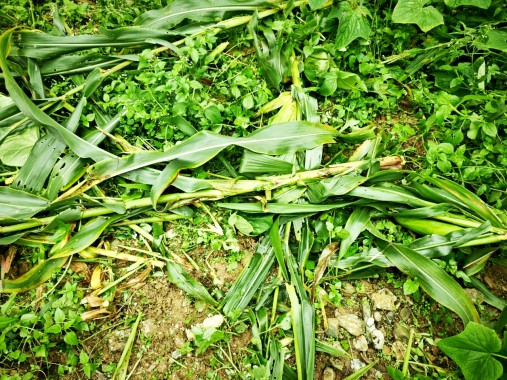Farmers across rural areas of Gyalshing district are grappling with repeated crop damage caused by wild animals, leading to significant agricultural losses and growing frustration. Wild boars, monkeys and peafowl specially are increasingly foraging in farmlands, particularly in areas with dense natural vegetation that has fostered a rise in wildlife populations and escalating human-wildlife conflict.
The worst-affected regions include Upper Bhaluthang under Sakyong Block, Byadung, Upper Kyongsa, Salley, Lungjik under Maneybung-Dentam constituency, and the low-lying areas of the Geyzing-Bermiok constituency. Farmers in these areas reported widespread destruction of crops due to the unchecked movement of wild animals.
In Upper Bhaluthang, wild boars have repeatedly destroyed cornfields with reports. These nocturnal animals are difficult to guard against, especially during late-night hours. A recent incident saw the cornfield of RoshanKhatiwada destroyed by wild boars during heavy rainfall on Tuesday night.
“This loss is disheartening. It’s a complete waste of time, labour and money,” said Khatiwada. “We stayed awake many nights trying to protect our crops, but the rain made it impossible. Despite several complaints, the Forest department has shown no seriousness in addressing this issue.”
The farmers in Upper Bhaluthang and Byadung, near Geyzing Bazaar, have been facing the brunt of wild boars menace since a long time.
Khatiwada added that repeated crop losses are discouraging farmers from continuing agriculture. “If this continues, farmers will lose interest in farming altogether,” he said, calling for urgent intervention by the authorities and the concerned departments.
In Lungjik, farmer GhanashyamAttri, a local farmer, expressed despair after losing his entire cornfield to a troop of monkeys.
“I was expecting a good harvest this year, but the entire crop is gone. The loss is irrecoverable,” he said. Attri added that the monkey menace has been ongoing for years, urging the state government to take effective action.
Monkeys have also been troubling farmers in Upper Kyongsa. Due to the rampant simian population, many farmers have abandoned cultivating crops or switched to monkey-resistant alternatives like ginger.
In the lower rural regions, peafowl have emerged as another major threat to agriculture. Traditionally found in warmer regions, these birds are now migrating to higher altitudes including Sakyong and surrounding areas. Their growing numbers and resistance to traditional scare tactics have made them a persistent menace.
“They destroy our crops regularly and scarecrows don’t work anymore. Our vegetable and crop yields have dropped drasticallydue to frequent crops damage caused by peafowl,” said a farmer from LowerGeyzing.
Efforts to contact DFO (Wildlife) NishaSubba for a comment were unsuccessful. Several farmers criticized the State government, claiming that despite initiatives to revive agriculture, the authorities have failed to address the growing human-wildlife conflict.
They pointed out that while wildlife protection laws are important, they also restrict farmers from taking necessary actions to protect their crops. Farmers are calling for the formulation of effective policies that safeguard both wildlife and the livelihoods of those dependent on farming.
“If this situation remains unresolved, we will be left with no choice but to give up agriculture,” one farmer said. Despite the challenges, many farmers remain hopeful that the government and concerned departments will eventually listen and take meaningful steps to address their plight.
Source - https://www.sikkimexpress.com













